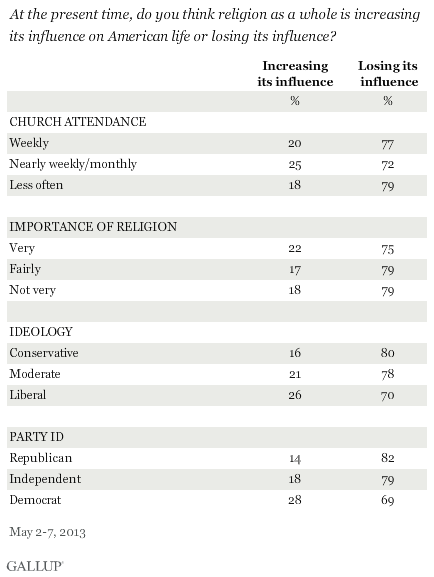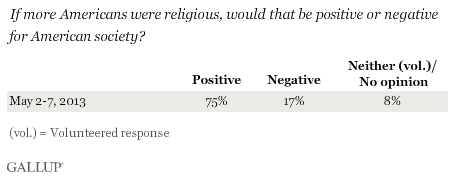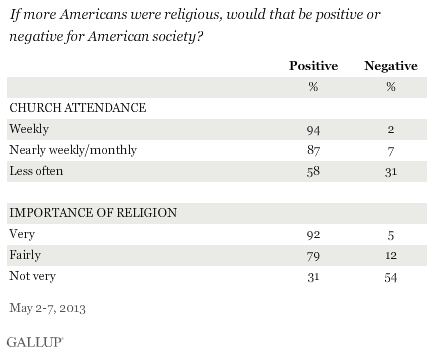PRINCETON, NJ -- Over three-quarters of Americans (77%) say religion is losing its influence on American life, while 20% say religion's influence is increasing. These represent Americans' most negative evaluations of the impact of religion since 1970, although similar to the views measured in recent years.

Americans over the years have generally been more likely to say religion is losing rather than increasing its influence in American life. In addition to the previous peak in views that religion was losing its influence measured in 1969 and 1970, at least 60% of Americans thought religion was losing its influence in 1991-1994, in 1997 and 1999, in 2003, and from 2007 to the present.
Americans were more likely to say religion was increasing rather than decreasing its influence when the question was first asked in 1957, in 1962, at a few points in the 1980s during the Reagan administration, after the 9/11 terrorist attacks in late 2001 and early 2002, and in 2005. The high point for Americans' belief that religion is increasing its influence, 71%, came in December 2001.
These perceptions of religion's influence in American society are not related to Americans' personal religiosity, as measured by church attendance or the self-reported importance of religion in one's life. In general, highly religious Americans are neither more nor less likely to say religion is losing its influence than those who are not religious. There is, however, a modest relationship between Americans' ideology as well as partisanship and their views of the influence of religion, with liberals and Democrats more likely than conservatives and Republicans to say religion's influence is increasing in American society.

Most Americans Also Say U.S. Would Be Better Off if More Americans Were Religious
A separate question found much more positive views of the potential for religion to have an impact on the country, with 75% of Americans saying they think it would be positive for American society if more Americans were religious.

Americans who attend church regularly and who say religion is important in their own lives are far more likely than others to say it would be positive for American society if more Americans were religious. Even so, over half of those who seldom or never attend and close to one in three Americans who say religion is not important to them personally still say it would be positive for society if more Americans were religious.

Implications
The view most Americans hold -- that religion is losing its influence on American life -- does not appear to reflect personal religiousness, but rather appears to reflect widely shared judgments on factors relating to the course of events in the U.S. In 1969 and 1970, with the Vietnam War raging in controversial fashion and with the cultural and sexual revolutions underway, and to a lesser degree at times in the 1990s, Americans held negative views similar to those they hold today. The degree to which these views changed during the Reagan years, and after 9/11, suggest that they could change again in the years ahead. The fact that most Americans think the country would be better off if more Americans were religious shows that many of those who believe religion is losing its influence may think this is a negative state of affairs.
Survey Methods
Results for this Gallup poll are based on telephone interviews conducted May 2-7, 2013, with a random sample of 1,535 adults, aged 18 and older, living in all 50 U.S. states and the District of Columbia.
For results based on the total sample of national adults, one can say with 95% confidence that the margin of sampling error is ±3 percentage points.
Interviews are conducted with respondents on landline telephones and cellular phones, with interviews conducted in Spanish for respondents who are primarily Spanish-speaking. Each sample of national adults includes a minimum quota of 50% cellphone respondents and 50% landline respondents, with additional minimum quotas by region. Landline telephone numbers are chosen at random among listed telephone numbers. Cellphone numbers are selected using random digit dial methods. Landline respondents are chosen at random within each household on the basis of which member had the most recent birthday.
Samples are weighted to correct for unequal selection probability, nonresponse, and double coverage of landline and cell users in the two sampling frames. They are also weighted to match the national demographics of gender, age, race, Hispanic ethnicity, education, region, population density, and phone status (cellphone only/landline only/both, cellphone mostly, and having an unlisted landline number). Demographic weighting targets are based on the March 2012 Current Population Survey figures for the aged 18 and older U.S. population. Phone status targets are based on the July-December 2011 National Health Interview Survey. Population density targets are based on the 2010 census. All reported margins of sampling error include the computed design effects for weighting.
In addition to sampling error, question wording and practical difficulties in conducting surveys can introduce error or bias into the findings of public opinion polls.
View methodology, full question results, and trend data.
For more details on Gallup's polling methodology, visit www.gallup.com.
